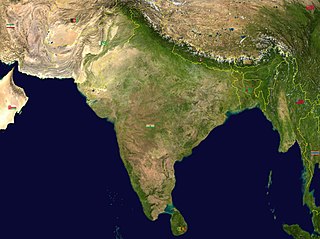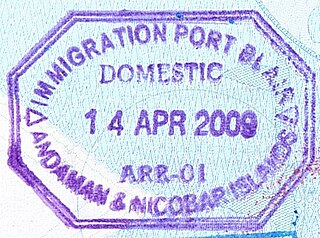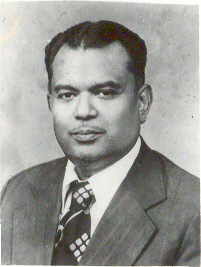Related Research Articles

India is situated north of the equator between 8°4' north to 37°6' north latitude and 68°7' east to 97°25' east longitude. It is the seventh-largest country in the world,with a total area of 3,287,263 square kilometres (1,269,219 sq mi). India measures 3,214 km (1,997 mi) from north to south and 2,933 km (1,822 mi) from east to west. It has a land frontier of 15,200 km (9,445 mi) and a coastline of 7,516.6 km (4,671 mi).

The Andaman and Nicobar Islands is a union territory of India. It consists of 836 islands grouped into two island groups:the northern Andaman Islands and the southern Nicobar Islands,separated by a 150 km (93 mi) wide channel. Port Blair is the capital and largest city of the territory,located about 1,190 km (740 mi) from Chennai and 1,255 km (780 mi) from Kolkata in mainland India. The islands are sandwiched between the Bay of Bengal to the west and the Andaman Sea to the east with the northern-most point located 901 km (560 mi) from the mouth of Hooghly river. Indira Point at 6°45’10″N and 93°49’36″E at the southern tip of Great Nicobar is the southernmost point of India.

Minicoy,locally known as Maliku,is an island in Lakshadweep,India. Along with Viringili,it is on Maliku atoll,the southernmost atoll of Lakshadweep archipelago. Administratively,it is a census town in the Indian union territory of Lakshadweep. The island is situated 425 km west of Trivandrum,the capital city of Kerala.

The Thangal Kunju Musaliar College of Engineering,commonly known as TKMCE,is the first government-aided engineering institution in the Indian state of Kerala,with foundation stone laid on 2nd February 1956,and inaugurated on 3 July 1958. The campus is located in Karicode,approximately 6 kilometres (3.7 mi) away from Kollam,Kerala,India. The college was affiliated to Kerala University before getting changed to APJ Abdul Kalam Technological University when it was formed in 2015. UGC conferred autonomous status to the institution in 2022.

There are 18 biosphere reserves in India. They protect larger areas of natural habitat than a typical national park or animal sanctuary,and often include one or more national parks or reserves,along with buffer zones that are open to some economic uses. Protection is granted not only to the flora and fauna of the protected region,but also to the human communities who inhabit these regions,and their ways of life. In total there are 18 biosphere reserves in India.
Sri Venkitaramanan was an Indian civil servant and economist who served as the 18th governor of the Reserve Bank of India between 1990 and 1992,where he oversaw India's actions to tide over the balance of payments crisis. His actions were noted to have helped the country out of the crisis when its foreign-exchange reserves had almost depleted and helped usher in the country's economic liberalisation programme in the early 1990s.

The Foreigners Order,1958 states that a Protected Area Permit (PAP) is required for non-Indian citizens to visit certain areas in India. Certain requirements have to be fulfilled in order to get this permit. Indian citizens who are not residents in these areas need an Inner Line Permit (ILP) to enter these places. The Inner Line Permit is significantly easier to get.

Harris Sam Sahayam Lawrence was an Indian educationalist born in Nagercoil,Tamil Nadu.
Palai Central Bank was a commercial bank headquartered in Kerala,South India that functioned during the middle of the last century. Although it was started in a small,remote city,the bank grew to become not only the largest bank but the largest institution in Kerala,after the state government,and the 17th largest among the 94 scheduled banks in India. The Kerala High Court in 1960 ordered the liquidation of the Palai Central Bank on a petition from the Reserve Bank of India.

The following outline is provided as an overview of,and topical guide to,India:

The Sálim Ali Centre for Ornithology and Natural History (SACON) is the South India centre of WII. It is a national centre for information,education and research in ornithology and natural history in India.

RBI Thiruvananthapuram is a branch office of the Reserve Bank of India,with its jurisdiction covering the State of Kerala and the Union Territory of Lakshadweep. This regional office contains nearly all of the major departments of Reserve Bank of India. The only exceptions are the departments of Foreign Exchange (FED) and Economic Policy &Research (DEPR),both of which are housed at the bank's sub-office at Kochi. The office is headed by Nirmal Chand,regional director.
Handball Federation of India (HFI) is the governing body for handball in India. HFI is registered under the Societies Registration Act,1860 at Rohtak. It is a member of the Asian Handball Federation (AHF) and the International Handball Federation (IHF) since 1974. It is also a member of Commonwealth Handball Association and South Asian Handball Federation. Originally,HFI was founded by Jagat Singh Chauhan from Rohtak (Haryana) who was an alumnus of YMCA College of Physical Education of Madras Chennai. He was also the first secretary general of HFI.
Deepali Pant Joshi is a former executive director of the Reserve Bank of India. She is a development economist and a writer on economic subjects. Her professional responsibilities have included the Department of Currency Management,Legal Department and Premises Department. She was the First Appellate authority under the Right to Information Act,as well as the RBI nominee on the governing council of the Institute of Banking Personnel Selection (IBPS) and director on the board of Bharatiya Reserve Bank Note Mudran Private Limited (BRBNMPL).

Coral reefs in India are one of the most ancient and dynamic ecosystems of India. The coral reefs not only provide a sanctuary to a myriad of marine life but also play a key role in protecting the coastline from erosion. India has about 7517 km of coastline including islands but mainland coast is 6100 km.
A. K. Bera is an Indian banker from Assam.
Narayana Balakrishnan Nair (1927–2010) was a marine biologist,ecologist and the founder president of Kerala Science Congress. He was known for his advocacy of trawling ban during monsoon seasons which was later accepted and imposed by the Government of Kerala. A Jawaharlal Nehru fellow,Nair was an elected fellow of all the major Indian science academies as well as the Zoological Society of London. The Council of Scientific and Industrial Research,the apex agency of the Government of India for scientific research,awarded him the Shanti Swarup Bhatnagar Prize for Science and Technology,one of the highest Indian science awards,in 1971,for his contributions to biological sciences. He received the fourth highest Indian civilian honor of the Padma Shri in 1984.
The 2017–18 Santosh Trophy qualifiers was the qualifying round for the 72nd edition of the Santosh Trophy,the premier competition in India for teams representing their regional and state football associations.
References
- ↑ "Board of Directors – South Indian Bank". SIB. Retrieved 30 June 2019.
- ↑ "Salim Gangadharan – Executive Profile". Bloomberg. Retrieved 30 June 2019.
- ↑ "South Indian Bank appoints Salim Gangadharan as Director". Money Control. Retrieved 30 June 2019.
- ↑ "RBI sets up Task Force on Capital Account Convertibility". RBI. Retrieved 30 June 2019.
- ↑ "National Institute of Education & Trainings – Advisory Board". NIET. Retrieved 30 June 2019.
- ↑ "National Institute of Skill Enhancement – Advisory Council". NISE. Retrieved 30 June 2019.